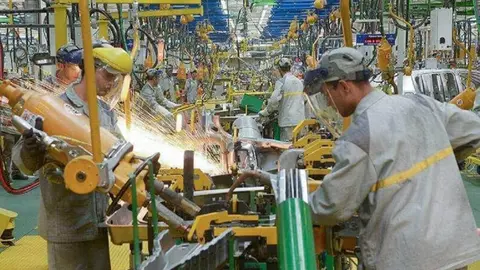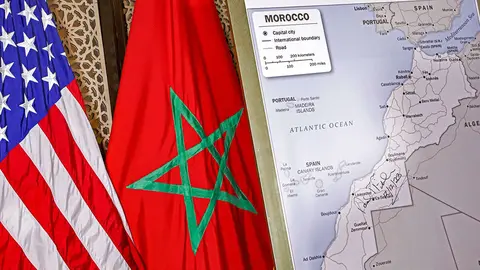Morocco encourages private investment

In order to share Morocco's strengths, ambitions and key initiatives, the Public Session had as its theme for discussion "Morocco: privileged land of private investment". A mission that is conditioned by the crucial role played by the 12 Regional Investment Centres (RICs) installed in the country's national territory.
The Annual Meetings of the World Bank and the International Monetary Fund, organised in Marrakech, are on the one hand an event that brings together more than 14,000 high-level participants, including finance ministers and central bank governors from 189 member countries of these institutions, as well as international investment funds and representatives of the private sector, NGOs and universities.
On the other hand, they are a unique opportunity to share the strengths that Morocco is acquiring day by day under the Royal Instructions of the Alaouite monarch, being an attractive destination for private investments.

As part of the promotion of Morocco as a host country for foreign investments and creator of a business climate focused on the private sector, the Ministry of Investment, Convergence and Evaluation of Public Policies in collaboration with the Moroccan Agency for Investment Development and Exports organised on Monday a high-level public session whose central theme was "Morocco: privileged land of private investments".
According to an official statement of the Ministry, influential actors in the private sector at a high level took part in this session. This reflects Morocco's ambition to position itself as a leading investment hub, where investors, innovation professionals and entrepreneurs can take advantage of the multiple business opportunities offered by the country in its different regions.
Private investors will therefore have the opportunity to set up innovative companies in Morocco, develop branches of multinational companies and invest in sectors of the future such as clean energy, new technologies or basic traditional sectors in the process of modernisation, such as agriculture, water and the agri-food industry, for example.
It should be recalled that the Minister of Investment, Mohcine Jazouli, launched earlier, at his meeting with the directors general of the 12 Regional Investment Centres, the strategic alignment of these centres in the twelve regions of Morocco.

In this regard, Morocco aims, by relying on the work of the RICs, to play a crucial role in the global energy transition, capitalise on the reorganisation of value chains and attract high value-added investments and create jobs throughout the national territory in an equitable manner, the same ministerial source added.
"Investing in Morocco is a winning bet (...) That is why we urge international players, financial organisations, as well as local and international private operators, to seize these opportunities and join this movement," said Mohcine Jazouli during a high-level public session "Morocco: privileged land for private investments", held on the occasion of the Annual Meetings of the World Bank (WB) and the International Monetary Fund (IMF).
The minister highlighted the many investment opportunities awaiting private and institutional investors. Among them are the implementation of the Nigeria-Morocco gas pipeline, the project to extend the high-speed train line (TGV) to Marrakech and Agadir, as well as high-voltage direct current lines to transmit green electricity from the southern regions of the Kingdom to key consumption areas and the expansion of the Royal Air Maroc (RAM) fleet by 2037, said Mohcine Jazouli, as reported by various media such as La Vie Eco.
Distinguished by a stable political and economic environment, a strategic geographical position, a hotbed of young talent and its pioneering role in renewable energies, the Kingdom of Morocco is considered an African "El Dorado" for investors seeking to work in an ever-improving business climate that adapts to the new environmental realities that the world is experiencing.
Thus, Morocco offers those who trust in its economic potential tax facilities and continuous support, as well as financial bonuses for investors who create jobs related to the professions of the future or for those who invest in the less attractive areas of the country's regions.
This is where the Regional Investment Centres come in, which were called upon during this session to oversee the integrity of the investment process and increase its efficiency, as well as to ensure the best support services for project holders until their final realisation, as underlined by the Ministry of Investment, Convergence and Evaluation of Public Policies, the guardian of the RICs in Morocco.

It is worth mentioning that, in order to achieve these objectives, Jazouli had launched the strategic alignment that will allow the LRCs to develop a roadmap that makes private investment the engine of economic revival in the Kingdom. This is all part of the vision of King Mohammed VI, who has set a target of 550 billion dirhams in private investment and 500,000 jobs created by 2026.
Following the operationalisation of the new Investment Charter, the establishment of the National Investment Commission, the unification of investment governance in convergence and collective intelligence between the Ministry of the Interior, the General Secretariat of the Government and the various departments involved, and thanks to the strategic alignment of the CRIs, as key players for investment in the territories, the implementation of the roadmap and the improvement of the business climate 2023-2026 will, as the minister declared to Moroccan media, be the action plan of extreme importance in terms of investment in the coming months.
With their strategic alignment, the RICs are today at the heart of the investment promotion operation, playing a key role in the implementation of the vision of the new development model, as well as the rules of the new Investment Charter. In fact, they are centres that ensure the visibility of Morocco's key opportunities and strengths, and accompany the procedures to domicile foreign companies in the country and internationalise national companies on the African continent or beyond.
In addition to the Investment Charter, the Mohammed VI Fund for Investment plays a key role in the growth of private investment, mobilising domestic and foreign capital to significantly increase private investment volumes in the Kingdom, the Moroccan minister added.










